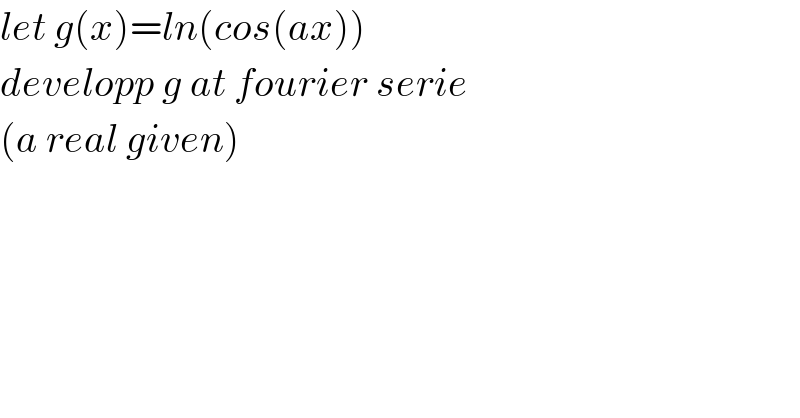Question Number 116556 by Bird last updated on 04/Oct/20

$${let}\:{g}\left({x}\right)={ln}\left({cos}\left({ax}\right)\right) \\ $$$${developp}\:{g}\:{at}\:{fourier}\:{serie} \\ $$$$\left({a}\:{real}\:{given}\right) \\ $$
Answered by maths mind last updated on 05/Oct/20
![let f(t)=ln(cos(t)) t∈]−(π/2),(π/2)[,cos(t)=((e^(it) +e^(−it) )/2) f(t)=ln(((e^(it) +e^(−it) )/2))=ln(1+e^(2it) )−ln(2e^(it) ) =Σ_(k≥0) (((−1)^k e^(2i(k+1)t) )/((k+1)))−ln(2)−it f(t)=f(−t)⇒f(t)=((f(t)+f(−t))/2) ⇒f(t)=(1/2)[Σ_(k≥0) (((−1)^k )/((k+1)))e^(2i(k+1)t) −ln(2)−it+Σ_(k≥0) (((−1)^k )/((k+1)))e^(−2i(k+1)t) −ln(2)+it] =−ln(2)+Σ_(k≥0) (((−1)^k )/((k+1))){((e^(2i(k+1)t) +e^(−2i(k+1)t) )/2)} =−ln(2)+Σ_(k≥0) (((−1)^k )/((k+1)))cos(2(k+1)t) g(x)=f(ax),∀x∈]−∣(π/(2a))∣,(π/(∣2a∣))[,∀a≠0 g(x)=−ln(2)+Σ_(k≥0) (((−1)^k )/(k+1))cos(2a(k+1)x)](https://www.tinkutara.com/question/Q116682.png)
$${let} \\ $$$${f}\left({t}\right)={ln}\left({cos}\left({t}\right)\right) \\ $$$$\left.{t}\in\right]−\frac{\pi}{\mathrm{2}},\frac{\pi}{\mathrm{2}}\left[,{cos}\left({t}\right)=\frac{{e}^{{it}} +{e}^{−{it}} }{\mathrm{2}}\right. \\ $$$${f}\left({t}\right)={ln}\left(\frac{{e}^{{it}} +{e}^{−{it}} }{\mathrm{2}}\right)={ln}\left(\mathrm{1}+{e}^{\mathrm{2}{it}} \right)−{ln}\left(\mathrm{2}{e}^{{it}} \right) \\ $$$$=\underset{{k}\geqslant\mathrm{0}} {\sum}\frac{\left(−\mathrm{1}\right)^{{k}} {e}^{\mathrm{2}{i}\left({k}+\mathrm{1}\right){t}} }{\left({k}+\mathrm{1}\right)}−{ln}\left(\mathrm{2}\right)−{it} \\ $$$${f}\left({t}\right)={f}\left(−{t}\right)\Rightarrow{f}\left({t}\right)=\frac{{f}\left({t}\right)+{f}\left(−{t}\right)}{\mathrm{2}} \\ $$$$\Rightarrow{f}\left({t}\right)=\frac{\mathrm{1}}{\mathrm{2}}\left[\underset{{k}\geqslant\mathrm{0}} {\sum}\frac{\left(−\mathrm{1}\right)^{{k}} }{\left({k}+\mathrm{1}\right)}{e}^{\mathrm{2}{i}\left({k}+\mathrm{1}\right){t}} −{ln}\left(\mathrm{2}\right)−{it}+\underset{{k}\geqslant\mathrm{0}} {\sum}\frac{\left(−\mathrm{1}\right)^{{k}} }{\left({k}+\mathrm{1}\right)}{e}^{−\mathrm{2}{i}\left({k}+\mathrm{1}\right){t}} −{ln}\left(\mathrm{2}\right)+{it}\right] \\ $$$$=−{ln}\left(\mathrm{2}\right)+\underset{{k}\geqslant\mathrm{0}} {\sum}\frac{\left(−\mathrm{1}\right)^{{k}} }{\left({k}+\mathrm{1}\right)}\left\{\frac{{e}^{\mathrm{2}{i}\left({k}+\mathrm{1}\right){t}} +{e}^{−\mathrm{2}{i}\left({k}+\mathrm{1}\right){t}} }{\mathrm{2}}\right\} \\ $$$$=−{ln}\left(\mathrm{2}\right)+\underset{{k}\geqslant\mathrm{0}} {\sum}\frac{\left(−\mathrm{1}\right)^{{k}} }{\left({k}+\mathrm{1}\right)}{cos}\left(\mathrm{2}\left({k}+\mathrm{1}\right){t}\right) \\ $$$$\left.{g}\left({x}\right)={f}\left({ax}\right),\forall{x}\in\right]−\mid\frac{\pi}{\mathrm{2}{a}}\mid,\frac{\pi}{\mid\mathrm{2}{a}\mid}\left[,\forall{a}\neq\mathrm{0}\right. \\ $$$${g}\left({x}\right)=−{ln}\left(\mathrm{2}\right)+\underset{{k}\geqslant\mathrm{0}} {\sum}\frac{\left(−\mathrm{1}\right)^{{k}} }{{k}+\mathrm{1}}{cos}\left(\mathrm{2}{a}\left({k}+\mathrm{1}\right){x}\right) \\ $$
